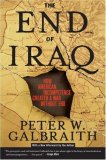Summary | Excerpt | Reviews | Beyond the Book | Readalikes | Genres & Themes | Author Bio

Critics' Opinion:
Readers' Opinion:
First Published:
Jul 2006, 272 pages
Paperback:
Jun 2007, 288 pages
 Book Reviewed by:
Book Reviewed by:
BookBrowse Review Team
Buy This Book
To this day, the time I spent on the Baghdad to Basrah highways haunts me. I should have not just sat there and watched. I should have fought for them. I should have done something, anything to stop the blood bath. We are sworn to protect and yet we sat, I sat and watched hundreds of thousands die in the most horrible ways possible.
Between March and September 1991, the Iraqi Army and security services killed as many as 300,000 Shiites. One mass grave near the city of Hillah is said to hold 30,000 bodies alone.
While George H. W. Bush's call for the uprising may well have been a careless ad lib, this is not how Iraq's Shiites saw it. They believe Bush encouraged the uprising and intentionally allowed Saddam to crush it because Bush wanted Shiites to be killed.
The Kurdish uprising began in a similar manner to the Shiite uprising, but ended very differently. On March 6, 1991, a mob attacked the Ba'ath Party headquarters in Rania, a town at the edge of the mountains in Eastern Kurdistan. By March 14, rebels controlled most of Kurdistan, and on March 21 the Kurds took over Kirkuk, the place some call Kurdistan's Jerusalem.
Like the Shiites in the south, the Kurds vented their fury against the regime. When the rebels took over the General Security Directorate headquarters in Suleimania, they caught the security agents about to execute the remaining prisoners. Instead, the security men were shot. An elderly woman threw herself on one of the corpses, biting and kicking it. As the crowd tried to pull her off, she explained, "He killed three of my sons. Don't I have the right to do this to him?"
On March 30, I was finally able to accept Talabani's invitation from the month before. A Kurdish medical student accompanied me from Damascus to Qameshli, a dusty town in Syria near the junction with Iraq, and Turkey. There, Kemal Kirkuki, a peshmerga commander, arranged with the Syrian authorities for me to cross into Kurdish-held Iraq. He assigned Abdul Karim, an engineer, to be my escort and driver. Karim proved unflappable, which was the only realistic option considering what happened.
From the Syrian bank of the Tigris, I could see, and film, Iraqi Army mortars exploding near the Kurdish peshmerga positions on the Iraqi side of the river. For reasons I cannot quite fathom now, I did not worry about the danger of being killed. I was, however, worried that the shelling could make it impossible for me to return to Syria in time for meetings scheduled in a few days. My absence might call career-ending attention to my presence in Iraq. I had been deliberately vague both with the U.S. Embassy in Damascus and with my bosses at the Foreign Relations Committee about northern Iraq being on my itinerary, although the U.S. ambassador to Syria, Edward Djerejian, understood that my interest in spending Easter in Qameshli had nothing to do with the place's intrinsic charms. Karim assured me I had nothing to worry about because the peshmerga were planning an operation that night to take out the Iraqi firing positions.
We crossed the Tigris in a small boat with an outboard motor and jumped into a captured Iraqi Army Toyota Land Cruiser waiting on the Iraqi side. There were two bullet holes on the driver's side of the windshield but I decided not to ask about them. At one point the asphalt stopped and there was an area where the road had been dug up. Karim and another peshmerga had an animated discussion as to which way to go and then carefully followed the ruts made by an earlier vehicle a few hundred yards to where the asphalt resumed. Only when we were back on the road did I realize we had just threaded our way through an Iraqi minefield. Our first stop was Zakho, a town of 100,000 on the Khabur River. In the town center, politicians gave speeches to enthusiastic crowds, and political banners were displayed everyplace. I had my picture taken under a banner written in English -- "We librated [sic] Kurdistan from the aggressors" -- and then we continued to Dahuk, a city of 300,000 fifty miles farther south.
Copyright © 2006 by Peter W. Galbraith





The House on Biscayne Bay
by Chanel Cleeton
As death stalks a gothic mansion in Miami, the lives of two women intertwine as the past and present collide.

The Flower Sisters
by Michelle Collins Anderson
From the new Fannie Flagg of the Ozarks, a richly-woven story of family, forgiveness, and reinvention.

The Funeral Cryer by Wenyan Lu
Debut novelist Wenyan Lu brings us this witty yet profound story about one woman's midlife reawakening in contemporary rural China.
Your guide toexceptional books
BookBrowse seeks out and recommends the best in contemporary fiction and nonfiction—books that not only engage and entertain but also deepen our understanding of ourselves and the world around us.